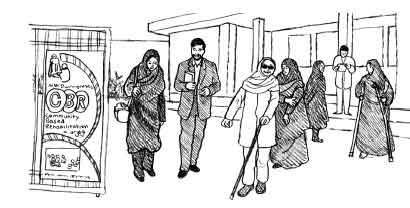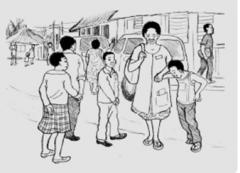Your progress
0%
complete

Guided by the provisions of the CRPD, CBR personnel can work with their communities to ensure that people with disabilities are able to access good-quality, inclusive, appropriate and timely medical care.
Learn how the assistance of a CBR worker allowed a young boy in Tanzania to manage his epilepsy and lead a more independent life.


Irene and Mohammed live in the United Republic of Tanzania. They were overjoyed when Adnan was born as they already had a six-year-old daughter and had waited a long time for another child. When Adnan was approximately two months old they noticed that his head appeared to get smaller. Irene and Mohammed took Adnan to the local hospital for medical care. An X-ray was taken, after which the doctors told Irene and Mohammed that there was nothing to worry about. However as Adnan grew older it became obvious that he was unable to perform simple tasks or follow basic instructions, and his behaviour become increasingly challenging. He also experienced regular convulsions. Irene explains, “He never spoke or made much sound so I never thought he understood anything and I didn’t really talk to him. What was the point? But his behaviour got worse and worse.”
Adnan only started walking at the age of four and when he was playing in the street one day, a passer-by, recognizing that Adnan had an intellectual impairment, told Irene and Mohammed about the local CBR run by a non-governmental organization called Comprehensive Community Based Rehabilitation in Tanzania (CCBRT). Adnan’s parents contacted CCBRT and Mama Kitenge, a CBR worker, started visiting their home regularly, providing education and therapy. She also helped the family access medical care to manage his convulsions. As a result, Adnan now takes regular medication to control his epilepsy.
Irene said “Before I joined the programme, Adnan was unable to do anything himself. He couldn’t eat or dress himself or wash his hands. He was not a settled, happy child. He just walked around all day and often got lost. I did not know what to do with him. The training has been really helpful, especially in instructions. Now I talk to him all the time and he understands what I say. He can carry water, feed himself and wash his face. I have shown him the way back home from the water point many times, always pointing out the same things to look for, so now he knows his way back home if he gets lost. He takes his epilepsy medicines regularly and does not have fits. It is a big change from before.”